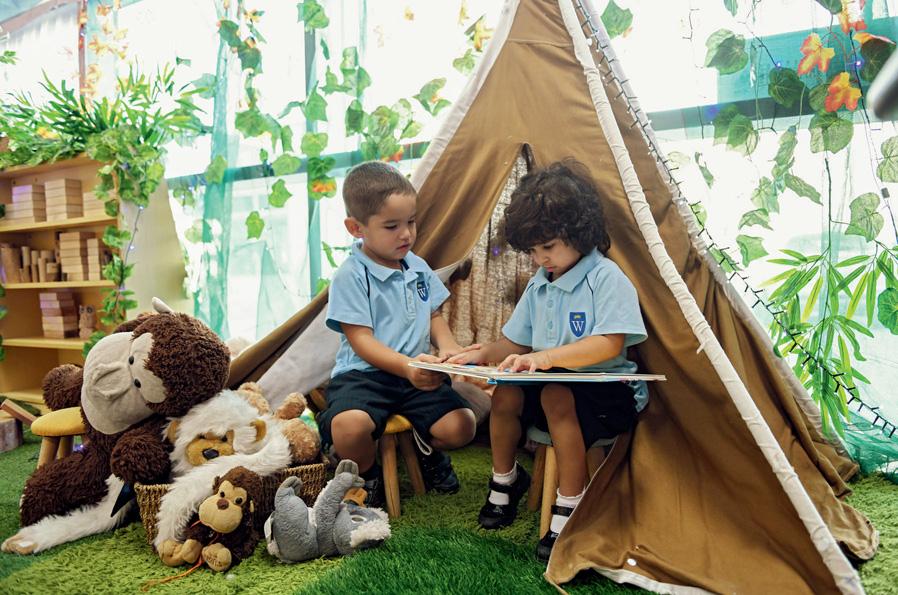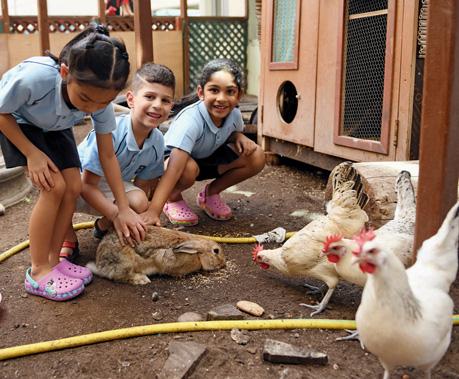
7 minute read
Is your child ready for ‘big school’?
Three educators share their opinions on preschool education and the Early Years Foundation Stage (EYFS) Curriculum
Charlotte Grieves, Head of Lower School, GEMS Wellington International School (WIS) There are so many benefits for our youngest learners to being part of a whole school environment, giving them the opportunity to integrate with older children and giving some the reassurance of having older siblings on site. Children who are ready for the school environment thrive on the challenge of becoming like their role models. This does not happen by chance. It is the result of a seamless transition from the Early Years through our lower, middle and upper school structures.
Advertisement
At WIS, the EYFS Curriculum is designed and adapted to suit the individual needs of our diverse international students following the framework of development matters (2012). This passion and drive is replicated across the school and everyone is committed to building on these foundations.
Peer-led learning Six engaging topics encompass all 17 specific areas of the curriculum, and this is achieved through purposeful playbased and innovative learning opportunities. Students are placed at the heart of planning, teaching and learning to allow them to build meaningful context behind the skills and concepts they will acquire throughout FS1 and FS2. Students use the characteristics of effective learning to independently explore indoor and outdoor learning zones. All of our children have varied opportunities to work with students from across the school setting. This is a wholeschool ethos where we encourage peer-led learning within the learning environment.
Innovative learning zones These zones enhance learning where students can often be seen utilising the spaces together. This cooperation enables students to learn from one another in the most effective ways. Teachers facilitate this way of learning to enable students to experience a variety of lessons in these zones, from cooking and enquiry-based challenges in the STEM zone to student-led projects in the creative and active zones, and the use of our student tech gurus in the digital zone. Children learning from children ensures they grow in confidence and aspire to improve and be the best they can be.
Outdoor learning This extension of the classroom allows for all aspects of the curriculum to be explored, enhanced and developed through carefully planned learning zones including water, gardening, our mud kitchen, STEM and construction. It allows children to be independent learners and encourages their imagination and curiosity to be designers, risk takers and problem solvers.
Outdoor learning has a positive impact on children’s sense of well-being and helps all aspects of their development and learning, from Personal Social Emotional Development (PSED) to gross and fine motor skills. It leads to greater depth and understanding of many concepts taught within the classroom. Here at WIS we value the importance of the outdoor environment where children feel free to explore, use their senses and be physically active.
“The EYFS sets standards for the learning, development and care of children from birth to five years old and ensures that all professionals have that set of common principles and commitments to deliver quality early education. It has been created to enhance play while embedding those important skills that young children need to learn in childcare experiences that develop the whole child, their relationships and their environment.” Charlotte Grieves, Head of Lower School, WIS

used to plan meaningful, multisensory, child-led, engaging lessons.
Bryan McAuley, Assistant Principal of Foundation Stage, GEMS Wellington Academy – Silicon Oasis (WSO) Nursery or School? Many parents have pondered this question; however, the most critical factor is finding the best place for your child. As stated in the British Early Years Curriculum, “Every child is unique.” Therefore it is the responsibility of schools or nurseries to ensure that students feel safe, loved and challenged in either setting. As a Foundation Stage, WSO has been rated as Outstanding by the KHDA for the last six years, and students have gained the most from their Foundation Stage experience when they have attended both FS years. According to UNICEF, “early years of childhood form the basis of intelligence, personality, social behaviour and capacity to learn and nurture oneself as an adult.” This belief is fostered at the heart of everything we do at WSO in a fun and innovative learning environment. The Early Years Foundation Stage Curriculum is Beyond the classroom At WSO, we believe that learning goes beyond the classroom. Our unique outdoor learning space allows for authentic and practical education where students are encouraged and inspired through positive outdoor experiences. Children are naturally drawn to the outdoors; however, for most children, the time for outdoor play is diminishing, contributing to more sedentary lifestyles, disconnected from the natural world. At WSO we promote outdoor play and learning and give the students opportunities to experiment, solve problems and think creatively. From an early age, the possibility to experience several opportunities for unstructured play, in which the child can decide what to do, with whom and how, promotes positive self-esteem, autonomy and confidence.
Performing arts To ensure our students are ‘worldready’, we have a particular focus on the world of performing arts. Through an emphasis on drama, dance and music, we encourage and support students to flourish across a variety of performance arts, from learning to play instruments to taking part in a stage show such as Oliver or Shrek.
Catherine McKeever, Principal, GEMS Wellington Primary School (WPS) Foundation Stage provision within a school setting such as Wellington Primary School provides a wealth of benefits to the children and families within our care. School settings like WPS have a dedicated principal who works closely alongside a fully qualified, experienced management team to provide an outstanding environment tailored to the children to allow them to grow and learn to the best of their ability. All teaching staff at WPS are Early Years specialists with qualified teacher status (QTS). This ensures that the children are being taught by practitioners with degreelevel qualifications and a wealth of knowledge from their time and experience in the Early Years.
Whole-school events A further advantage of having a Foundation Stage unit within the school setting is that the children have a secure sense of belonging from an early age, moving up to another year group full of confidence as they are given opportunities to join in wholeschool events and see their older friends move on confidently each year. As Early Years practitioners, we encourage children to complete the two years of the Early Years Curriculum. We know that their development in the seven prime areas (see box out) is more secure as we monitor their progress and development regularly. This means that they have increased levels of well-being, self-regulation and resilience for whatever challenges school might have in store for them.
Dedicated staff, facilities Furthermore, children have access to a wealth of specialists, teachers and facilities with dedicated Early Years-trained PE, music and Arabic teachers. The school prides itself in the facilities that are available even at this young age, such as the dance studio, library, computer suite, Early Years swimming pool and specialised performing arts studios. The school is supported by dedicated inclusion teams, therapists, counsellors and medical teams, which means that every child’s needs are catered for, allowing children to flourish holistically. Multi-agency teams ensure that the correct and most relevant information is shared with appropriate professionals to provide the best possible support. Parents may rest easy with the
What exactly is EYFS?
The Early Years Foundation Stage (EYFS) is a UK-based framework for learning, development and care of children from birth to five years old. The EYFS framework supports an integrated approach to early learning and care. It gives all professionals a set of common principles and commitments to deliver quality early education and childcare experiences. More than 200 schools across the UAE follow the EYFS, including childminders, preschools, nurseries and school reception classes.
The 7 areas of learning are: – Communication and language – Physical development – Personal, social and
emotional development – Literacy – Mathematics – Understanding the world – Expressive arts and design
assurance that the school is assessed annually by KDHA and monitored by our own governing body who will monitor school policies and practices.
“In this modern world, it is unrealistic for us to expect children to be able to enter primary school and be successful without having previous experience of a range of learning opportunities. Foundation Stage settings, such as ours at WPS, allow children to become familiar and comfortable within a learning environment. Data shows the academic progress for children within a school setting is significantly higher than that of children in a nursery setting due to the high quality delivery of the engaging EYFS Curriculum.” Jennifer Ringland, Head of FS1, WPS











